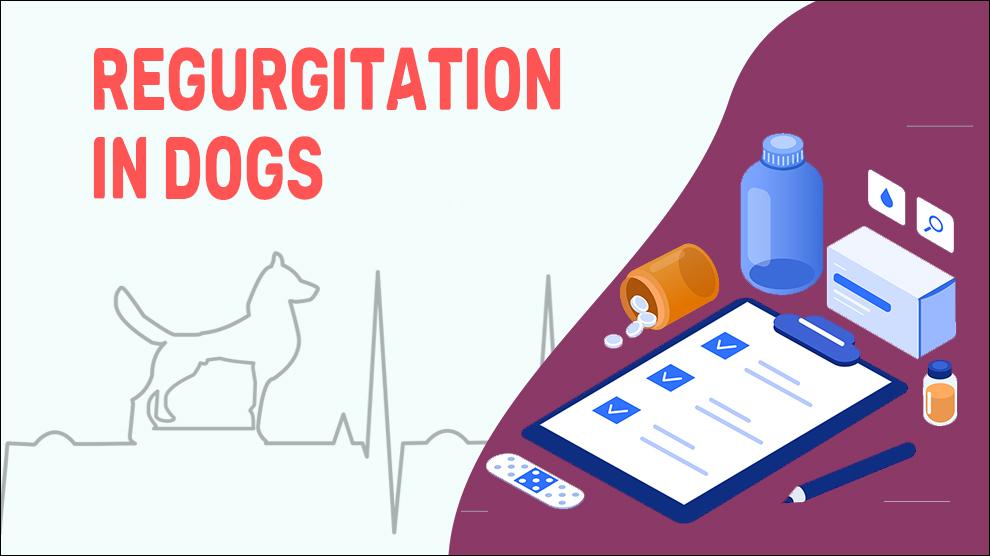Regurgitation is the non-nauseating evacuation of undigested food, water, or saliva from the stomach or esophagus without dynamic muscle contractions in the abdomen. The regurgitated contents are spewed out effortlessly without any audible retching or warning.
The dogs barf on the grass mainly for two reasons. Regurgitation can be an attempt to expel undigested food or bones including a quickly consumed excess food, water, grass, or any foreign material that has stuck in the throat.
This can also be a response to a deeper physiological disorder such as Gastric reflux (stomach contents come back up into the esophagus), esophagitis (inflammation of the esophagus), and obstruction or stricture in the esophagus.
Another most common reason for regurgitation is Megaesophagus, the condition in which the esophagus gets enlarged hampering its motility (its ability to food move into the stomach). When food pipe motility is absent/decreased/interrupted, food and liquid mount up in the esophagus and causing them to regurgitate.
Regurgitation vs. vomiting
Regurgitation is different from vomiting. Vomiting is an active business as a pet will gag; heave and the body actively retches or expel the stomach contents. Pets will have a connected sensation of nausea prior to vomiting even humans have. Your pet may also lick its lips or drool before vomiting indicating nausea.
Nevertheless, regurgitation is a passive process. Food and water splashes in the esophagus and gravity make it released back up. With respect to regurgitation, there is no heaving, gagging, or retching.
Symptoms Of Regurgitation
- Regurgitating food or water
- Trouble swallowing/ Exaggerated or frequent swallowing
- Pale gums, sunken eyes
- Signs of dehydration
- Temporarily reduced appetite
Treatment Options For Regurgitation
Sporadic regurgitation attempts of undigested food are quite normal. When your dog’s regurgitation attempts are too frequent or if it lasts longer than a few minutes, there is a greater reason for concern.
Medication –
A prokinetic agent: (e.g. cisapride, 0.1 mg/kg orally; metoclopramide, 0.2 to 0.4 mg/kg orally; erythromycin, 0.5 to 1 mg/kg orally)
H2 blockers: Pepcid, Zantac or Tagamet
A gastric mucosal protectant: (e.g. antacid or H2–receptor antagonist, sucralfate)
Home Remedies For Regurgitation
- Make sure your dog stays vertical for about 15 minutes after you feed.
- Gravity take care of everything and moves the food and water into the stomach. Water must also be given in this fashion.
- Change the food to a different texture or experiment with the food. Some animals do good with solid foods and some with liquid foods.
- Canned food can be rolled into small meatballs. The meatballs must be swallowed by the dog and this stimulates enough esophageal motility to easily pass through the esophagus.
Prevention Of Regurgitation
- Fix a particular type of feeding schedule in place. This is one of the most important ways to lower the frequency of your dog’s regurgitation or vomiting.
- Divide 3 meals into 5-6 mini-meals and introduction of a healthy late-night snacking right before sleep to decrease the night fasting period.
- Careful with your food measurements and don’t overindulge.
- Some vets recommend feeding a little food in the morning.
Affected Breeds Of Regurgitation
There is no breed disposition.
Most represented breeds are Miniature Schnauzer, Great Dane, German Shepherd, Labrador Retriever, Irish Setter, Newfoundland, Shar Pei, Wire Fox Terrier, Young Dogs
Additional Facts For Regurgitation
1. Causes of regurgitation but this list are not meant to be all-inclusive:
- Aspiration pneumonia
- Aspiration pneumonia
- Colitis
- Cancer
- Food allergy
- Esophagus autoimmune disorders (e.g., myasthenia gravis)
- The esophagus blockage by scar tissue or tumor or a foreign body.
- GI foreign bodies
- Gastritis
- Giardia infection
- Hormonal disorders (e.g., hypoadrenocorticism (Addison's disease), hypothyroidism)
- Helicobacter infection
- Hiatal hernia (stomach sneaks up into the diaphragm)
- Inflammatory bowel disease (IBD)
- Intestinal parasites
- Liver failure
- Physalopterosis (gastrointestinal infection caused by stomach worm)
- Pancreatitis
- Stomach ulcer
- Toxin exposure /Severe inflammation of the esophagus
2. Types
Congenital regurgitation:
Some breeds are predisposed for regurgitation due to congenital anomalies in the esophagus
Acquired regurgitation: This is generally caused due to a neuromuscular disease such as myasthenia gravis, inflammation of the esophagus, an esophageal tumor, parasitic infections, a foreign body in the esophagus, or some form of toxicity.
Idiopathic regurgitation: Late onset and occurs in older dogs without no known cause.
3. Mortality:
Regurgitation in dogs due to cancer and toxins are fatal and the mortality rate is actually higher.
4. Diagnosis:
Regurgitation is usually diagnosed based on:
- Your pup’s medical history
- A normal physical examination
- Signs of chronic/regular vomiting
- Absence of evidence of other causes
The vet may perform diagnostic tests to rule out other causes (eg abdominal x-rays, a fecal exam, urinalysis, or abdominal ultrasound).
5. Prognosis:
Prognosis depends on the diagnosis and appropriate treatment for acquired cases of megaesophagus. Very severe cases with aspiration pneumonia have a poor prognosis.
When To See A Vet
- More vomits resulting in dehydration.
- Your pet has vomited several times.
- Abnormal vomit, either blood, pink, dark brown, or black.
- You are concerned about diarrhea or inappetence or abdominal pain.
Food Suggestions For Regurgitation
Best foods to stop regurgitation or vomiting:
- 75% of a Dog’s food should be complete, wholesome food certified by the Association of American Feed Control Officials (AAFCO).
- The remaining 25% of your dog’s diet can be canned food or other foods.
- A small bedtime low-fat snack.
- Bland diet: boiled chicken, cooked rice, tofu, low-fat cottage cheese, boiled hamburger, canned tuna, etc.
Conclusion
There is no separate treatment for regurgitation. The treatment depends on the underlying disease or condition or any exposure to toxins. Proper diagnosis of this condition is always best left to your vet to make sure that it is not progressing into a serious form.

















